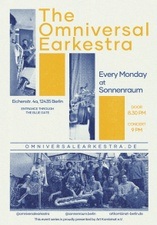Sonic Pluriverse Festival: Terapia - Siti Muharam, Aziza Brahim, Wahid Paradis
In the organizer's words:
Aziza Brahim
Aziza Brahim's life was shaped by the expulsion and political oppression of the Sahrawi population that followed Morocco's invasion of Western Sahara in 1975. She fled to Cuba as a teenager, discovered her passion for songwriting there and now lives in Barcelona.
Brahim's music is a powerful and nuanced blend of different musical cultures, with elements of West African, Iberian, Mediterranean and Afro-Cuban traditions. Drawing on her Saharawi heritage, she often incorporates the hypnotic sounds of haul - vocals accompanied by tabal rhythms - into her compositions as a means of expressing her culture and identity. As a songwriter, singer and instrumentalist, Brahim has become a prominent and eloquent spokesperson for the Sahrawi people and their ongoing struggle for recognition and justice.
Mawja (2023), her fifth studio album, has a deep connection to her roots. "Mawja was the word my grandparents used when they switched on the old portable radio we had in the house," says Brahim. Her work is like a journey through origins, memories, displacement, injustice and resistance, catalyzed by poetry and music.
Siti Muharam
The musical legacy of her great-grandmother, the esteemed taarab virtuoso Siti binti Saad, lives on in Siti Muharam's timbre. She was celebrated as an icon in an era of the genre dominated by male artists and made history in 1920 as the first female artist from East Africa to make commercial recordings. Over a century later, Siti binti Saad's great-granddaughter is committed to honoring and preserving this legacy.
Siti Muharam pursues her art with unwavering passion and brings new vitality to the genre. In her interpretations, she channels the innovative spirit and unwavering dedication that characterized her great-grandmother's craft. On her album Siti of Unguja (2023), Muharam masterfully references Saad's era by incorporating the percussive Kidumbak style and stripping away the formal layering of taarab to evoke the eclectic essence of Zanzibar's Swahili street culture that heavily influenced Saad.
Kidumbak is characterized by a fusion of Swahili poetry, Quranic verse, African polyrhythms and a range of Indian and European influences. With its rhythmic complexity and melodic depth, this distinctive and versatile genre is constantly evolving and remains highly relevant.
Wahid Paradis
The combination of Wahid Paradis' extensive vinyl collection, his excellent taste and his virtuosity as a DJ creates an atmosphere that captivates the audience from start to finish. In his sets, Wahid Paradis effortlessly combines eclectic Arabic sounds with strong accents of Lebanese synth-pop and cosmic disco sounds of the 80s - an invitation to collective listening, empathy and spontaneous dancing.











